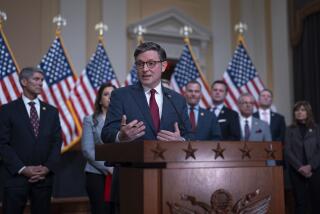GOP Drops Bill to Rein In Laws on Environment
House Republican leaders, caught in election-year political crosswinds, retreated Tuesday from attempts to pass legislation that critics say would roll back government enforcement of environmental and public health legislation.
The decision to pull the bill from the House floor just before debate was to begin was one of several signs of disarray among Republicans that raises questions about whether they can gain approval for other controversial items in their “contract with America” agenda during this campaign year.
“There’s no way you can escape the reality. This is an election year,” said Rep. Sherwood Boehlert (R-N.Y.). “A great many people think [that] on some of these issues we should slow down a bit.”
There were other signs, as well, that Republicans were struggling to find their way. In a marked departure from the balanced-budget strategy that collapsed six weeks ago, House Republicans unveiled a proposal to keep the government operating for the rest of the fiscal year, which ends this September. The measure also would provide money for pet White House programs, but less than President Clinton wants--and only if he proposes savings in other areas.
Until six weeks ago, congressional Republicans were trying to force Clinton to accept their balanced-budget plan by refusing to approve funding for many federal agencies, a strategy that forced much of the government to shut its doors in parts of November, December and January and threatens still another partial closure in 10 days.
At issue in the regulatory fight is much-delayed legislation that would have forced agencies throughout the government to conduct periodic reviews of a wide range of regulations involving environmental protection, workplace safety and public health.
At the last minute Tuesday, a small group of Republicans agreed to seek a compromise. Instead of requiring a review of all existing and new regulations over seven to nine years, the compromise would focus on a number of specific regulations that Republicans believe should be reevaluated.
Critics said that the broader measure could have forced the Environmental Protection Agency, the Occupational Safety and Health Administration and other departments to rewrite regulations to reduce costs to industry without regard to health and environmental protection.
Proponents had argued that the legislation would bring long-overdue relief, particularly to small businesses hard-pressed to meet the demands of government regulators. Republican leaders had viewed it as a way to restrict the enforcement of regulations by subjecting them to frequent reviews that critics said would be time-consuming and expensive.
House Majority Whip Tom DeLay (R-Texas) presented the retreat as a political one made because he does not want to expose his House GOP allies to criticism that they have shortchanged the environment--especially if the Senate fails to enact similarly tough legislation.
In the Senate, Republican Whip Trent Lott of Mississippi said that body would act, possibly by Thursday, on a watered-down measure that has bipartisan backing. The measure would subject certain regulations to judicial review for the first time if compliance with them is thought to be unfairly burdensome to small businesses. But it would avoid periodic government review of all regulations.
Complaining Tuesday in a speech to the National Assn. of Counties that the House measure “puts polluters first,” Carol Browner, administrator of the EPA, said the measure would undermine public health and environmental protection by reopening “public health standards that have long since stood the test of time.”
The EPA, offering an extreme scenario, said the 23-year-old program to eliminate leaded gasoline would be open to reconsideration.
In addition, said Karen Florini, a senior attorney with the Environmental Defense Fund, “key environmental safeguards will be at risk of being rolled back simply because agencies will be unable, in an era of shrinking budgets, to comply with the bill’s onerous provisions for constant reevaluation of current safeguards.”
“This package spells relief,” said Rep. William F. Clinger Jr. (R-Pa.), chief co-sponsor of the measure with Rep. Henry J. Hyde (R-Ill.).
On the budget front, House Appropriations Committee Chairman Bob Livingston (R-La.) unveiled a bill, which is to go before the House on Thursday, to extend spending authority for nine Cabinet departments whose funding expires March 15.
The proposal marks a retreat from recent GOP strategy of providing only short-term funding for the government. The bill would provide an additional $3.5 billion for education, environmental protection and other top Clinton priorities if the administration proposes savings in other areas to pay for it. That is less than half the $8 billion sought by Clinton.
The Senate Appropriations Committee is expected to consider a companion bill today that would go even further toward accommodating the administration’s concerns. It would provide more money for Clinton’s national service program and environmental protection and a $4.6-billion contingency fund for education and other administration priorities.
More to Read
Start your day right
Sign up for Essential California for news, features and recommendations from the L.A. Times and beyond in your inbox six days a week.
You may occasionally receive promotional content from the Los Angeles Times.







